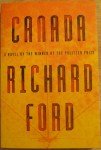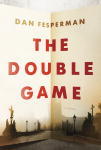 I really saved and savored Richard Ford’s current novel, Canada, and finally finished it while in the air flying home from Toronto earlier this week. Immediately after completing it I began re-reading Chapter One, where 15-year old Dell Parsons opens the book by telling readers that
I really saved and savored Richard Ford’s current novel, Canada, and finally finished it while in the air flying home from Toronto earlier this week. Immediately after completing it I began re-reading Chapter One, where 15-year old Dell Parsons opens the book by telling readers that
“First, I’ll tell about the robbery our parents committed. Then about the murders, which happened later. The robbery is the more important part, since it served to set my and my sister’s lives on the courses they eventually followed. Nothing would make complete sense without that being told first.”
I had written about the book at earlier stages in my reading, and now I can say with sure conviction that it is a great novel. The measured pace of it; the mounting force of Dell Parsons’ adolescent voice; the shocking violence that suddenly invades the seemingly placid narration; the amoral nature of many of the adults in the tale; the way Ford evokes character and place in Montana and the Canadian prairies, in short, sharp strokes that left me wanting to re-read his chiseled sentences–all these things combined to leave an indelible mark on my consciousness while reading it, and once I’d finished it, impelled me to want to start it all over again, eager to riddle out the narrative from the start. It’s one of those novels that teaches you to how read it, while you’re reading it.
I am aware that Canada has had mixed reviews–for instance, the reviewer in Publishers Weekly didn’t care for it, asserting that the first two parts of the book, set in Montana, then Saskatchewan, made little sense together–but I don’t agree. It all worked for me, and brilliantly. Now I want to go back and read more of Ford’s earlier work, and re-read the ones I read years ago.
 #FridayReads, July 13–Finished The Double Game, a brilliant and compelling espionage novel by Dan Fesperman. I loved the end as much as the first half. The mark of quality here is defined by the appendix of 218 books at the back of Fesperman’s book that he read and drew from in writing his latest work. As I posted in my #FridayReads last week, “Terrific dialogue, characters, and use of dozens of classic espionage books as clues and plot points. Sonny Mehta’s letter on the back of the galley is right: ‘For anyone who loves a good spy thriller–and who has loved them for years–this will be a treat.’”
#FridayReads, July 13–Finished The Double Game, a brilliant and compelling espionage novel by Dan Fesperman. I loved the end as much as the first half. The mark of quality here is defined by the appendix of 218 books at the back of Fesperman’s book that he read and drew from in writing his latest work. As I posted in my #FridayReads last week, “Terrific dialogue, characters, and use of dozens of classic espionage books as clues and plot points. Sonny Mehta’s letter on the back of the galley is right: ‘For anyone who loves a good spy thriller–and who has loved them for years–this will be a treat.’”
 #FridayReads, July 6–Reading a galley of “The Double Game,” Dan Fesperman’s terrific homage to spy fiction, a Knopf novel coming late August. Terrific dialogue, characters, and use of dozens of classic espionage books as clues and plot points. Sonny Mehta’s letter on the back is right: “For anyone who loves a good spy thriller–and who has loved them for years–this will be a treat.”
#FridayReads, July 6–Reading a galley of “The Double Game,” Dan Fesperman’s terrific homage to spy fiction, a Knopf novel coming late August. Terrific dialogue, characters, and use of dozens of classic espionage books as clues and plot points. Sonny Mehta’s letter on the back is right: “For anyone who loves a good spy thriller–and who has loved them for years–this will be a treat.”









